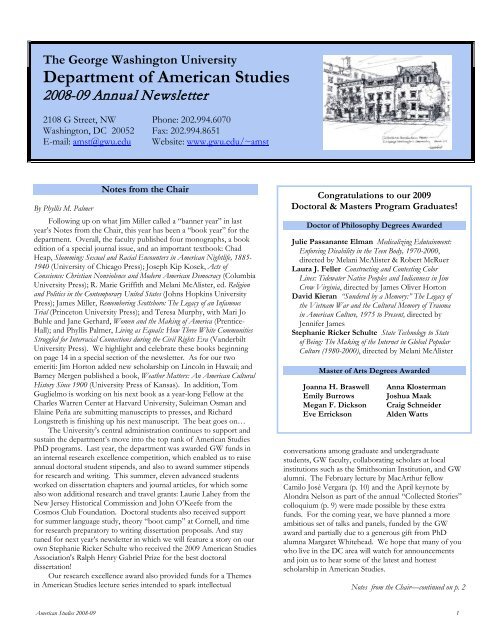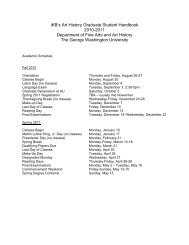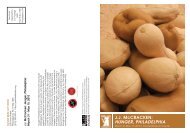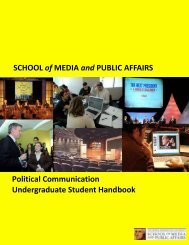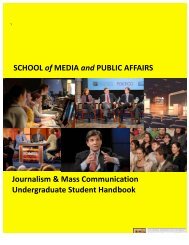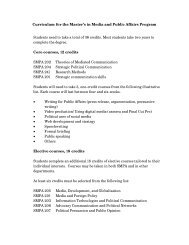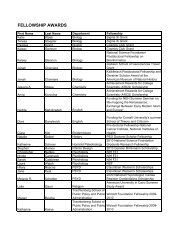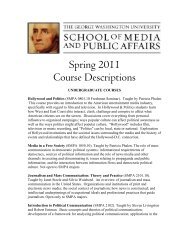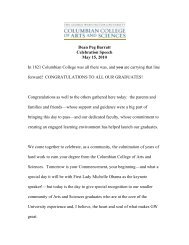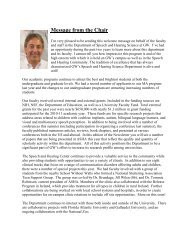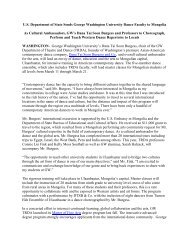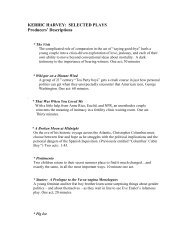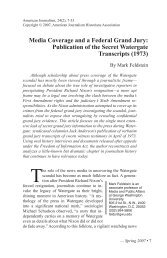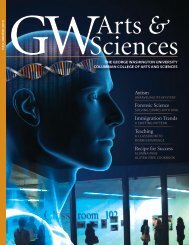Columbian College of Arts and Sciences - The George Washington ...
Columbian College of Arts and Sciences - The George Washington ...
Columbian College of Arts and Sciences - The George Washington ...
You also want an ePaper? Increase the reach of your titles
YUMPU automatically turns print PDFs into web optimized ePapers that Google loves.
<strong>The</strong> <strong>George</strong> <strong>Washington</strong> University<br />
Department <strong>of</strong> American Studies<br />
2008-09 Annual Newsletter<br />
2108 G Street, NW Phone: 202.994.6070<br />
<strong>Washington</strong>, DC 20052 Fax: 202.994.8651<br />
E-mail: amst@gwu.edu Website: www.gwu.edu/~amst<br />
Notes from the Chair<br />
By Phyllis M. Palmer<br />
Following up on what Jim Miller called a “banner year” in last<br />
year’s Notes from the Chair, this year has been a “book year” for the<br />
department. Overall, the faculty published four monographs, a book<br />
edition <strong>of</strong> a special journal issue, <strong>and</strong> an important textbook: Chad<br />
Heap, Slumming: Sexual <strong>and</strong> Racial Encounters in American Nightlife, 1885-<br />
1940 (University <strong>of</strong> Chicago Press); Joseph Kip Kosek, Acts <strong>of</strong><br />
Conscience: Christian Nonviolence <strong>and</strong> Modern American Democracy (Columbia<br />
University Press); R. Marie Griffith <strong>and</strong> Melani McAlister, ed. Religion<br />
<strong>and</strong> Politics in the Contemporary United States (Johns Hopkins University<br />
Press); James Miller, Remembering Scottsboro: <strong>The</strong> Legacy <strong>of</strong> an Infamous<br />
Trial (Princeton University Press); <strong>and</strong> Teresa Murphy, with Mari Jo<br />
Buhle <strong>and</strong> Jane Gerhard, Women <strong>and</strong> the Making <strong>of</strong> America (Prentice-<br />
Hall); <strong>and</strong> Phyllis Palmer, Living as Equals: How Three White Communities<br />
Struggled for Interracial Connections during the Civil Rights Era (V<strong>and</strong>erbilt<br />
University Press). We highlight <strong>and</strong> celebrate these books beginning<br />
on page 14 in a special section <strong>of</strong> the newsletter. As for our two<br />
emeriti: Jim Horton added new scholarship on Lincoln in Hawaii; <strong>and</strong><br />
Barney Mergen published a book, Weather Matters: An American Cultural<br />
History Since 1900 (University Press <strong>of</strong> Kansas). In addition, Tom<br />
Guglielmo is working on his next book as a year-long Fellow at the<br />
Charles Warren Center at Harvard University, Suleiman Osman <strong>and</strong><br />
Elaine Peña are submitting manuscripts to presses, <strong>and</strong> Richard<br />
Longstreth is finishing up his next manuscript. <strong>The</strong> beat goes on…<br />
<strong>The</strong> University’s central administration continues to support <strong>and</strong><br />
sustain the department’s move into the top rank <strong>of</strong> American Studies<br />
PhD programs. Last year, the department was awarded GW funds in<br />
an internal research excellence competition, which enabled us to raise<br />
annual doctoral student stipends, <strong>and</strong> also to award summer stipends<br />
for research <strong>and</strong> writing. This summer, eleven advanced students<br />
worked on dissertation chapters <strong>and</strong> journal articles, for which some<br />
also won additional research <strong>and</strong> travel grants: Laurie Lahey from the<br />
New Jersey Historical Commission <strong>and</strong> John O’Keefe from the<br />
Cosmos Club Foundation. Doctoral students also received support<br />
for summer language study, theory “boot camp” at Cornell, <strong>and</strong> time<br />
for research preparatory to writing dissertation proposals. And stay<br />
tuned for next year’s newsletter in which we will feature a story on our<br />
own Stephanie Ricker Schulte who received the 2009 American Studies<br />
Association's Ralph Henry Gabriel Prize for the best doctoral<br />
dissertation!<br />
Our research excellence award also provided funds for a <strong>The</strong>mes<br />
in American Studies lecture series intended to spark intellectual<br />
Congratulations to our 2009<br />
Doctoral & Masters Program Graduates!<br />
Doctor <strong>of</strong> Philosophy Degrees Awarded<br />
Julie Passanante Elman Medicalizing Edutainment:<br />
Enforcing Disability in the Teen Body, 1970-2000,<br />
directed by Melani McAlister & Robert McRuer<br />
Laura J. Feller Constructing <strong>and</strong> Contesting Color<br />
Lines: Tidewater Native Peoples <strong>and</strong> Indianness in Jim<br />
Crow Virginia, directed by James Oliver Horton<br />
David Kieran “Sundered by a Memory:” <strong>The</strong> Legacy <strong>of</strong><br />
the Vietnam War <strong>and</strong> the Cultural Memory <strong>of</strong> Trauma<br />
in American Culture, 1975 to Present, directed by<br />
Jennifer James<br />
Stephanie Ricker Schulte State Technology to State<br />
<strong>of</strong> Being: <strong>The</strong> Making <strong>of</strong> the Internet in Global Popular<br />
Culture (1980-2000), directed by Melani McAlister<br />
Master <strong>of</strong> <strong>Arts</strong> Degrees Awarded<br />
Joanna H. Braswell<br />
Emily Burrows<br />
Megan F. Dickson<br />
Eve Errickson<br />
Anna Klosterman<br />
Joshua Maak<br />
Craig Schneider<br />
Alden Watts<br />
conversations among graduate <strong>and</strong> undergraduate<br />
students, GW faculty, collaborating scholars at local<br />
institutions such as the Smithsonian Institution, <strong>and</strong> GW<br />
alumni. <strong>The</strong> February lecture by MacArthur fellow<br />
Camilo José Vergara (p. 10) <strong>and</strong> the April keynote by<br />
Alondra Nelson as part <strong>of</strong> the annual “Collected Stories”<br />
colloquium (p. 9) were made possible by these extra<br />
funds. For the coming year, we have planned a more<br />
ambitious set <strong>of</strong> talks <strong>and</strong> panels, funded by the GW<br />
award <strong>and</strong> partially due to a generous gift from PhD<br />
alumna Margaret Whitehead. We hope that many <strong>of</strong> you<br />
who live in the DC area will watch for announcements<br />
<strong>and</strong> join us to hear some <strong>of</strong> the latest <strong>and</strong> hottest<br />
scholarship in American Studies.<br />
Notes from the Chair—continued on p. 2<br />
American Studies 2008-09 1
Emerita Pr<strong>of</strong>essor Phyllis Palmer—Retired <strong>and</strong> Still Going Strong!<br />
Phyllis Palmer is retiring after 33 years at GW! Given that many<br />
<strong>of</strong> the last 15 or so were spent as chair <strong>of</strong> the American Studies<br />
department, Phyllis writes: “What an honor <strong>and</strong> privilege it has been<br />
to have the AMST faculty as my colleagues, as well as many friends in<br />
Art History, English, History, <strong>and</strong> Women’s Studies. And how lucky I<br />
have been to be able to teach, research, <strong>and</strong> conclude my faculty time<br />
with a new book.” As Phyllis approached the retirement age <strong>of</strong> 65,<br />
which is compulsory for academics in the UK, she saw the wisdom <strong>of</strong><br />
a slightly-older English friend’s decision to retire so that PhD students<br />
might have more job possibilities. Phyllis concludes, “as I look at the<br />
talented young scholars being trained in our department, <strong>and</strong> the<br />
accomplished scholars we have interviewed <strong>and</strong> been fortunate to<br />
hire, I knew that I had been fortunate to do this work <strong>and</strong> that it was<br />
time to pass the baton to a new generation.”<br />
Phyllis insists that “retirement” does not mean she’s leaving the<br />
University: “In 2009-10, with the new title <strong>of</strong> Academic Assessment<br />
Consultant, I will be working part-time with GW <strong>Arts</strong> & <strong>Sciences</strong><br />
faculty to be more intentional about what <strong>and</strong> how we teach. This<br />
spring, I will teach a Dean’s Seminar on food politics <strong>and</strong> food policy.<br />
Working with first-year undergraduates, we will discuss what one does<br />
next after reading Michael Pollan’s <strong>The</strong> Omnivore’s Dilemma. What else<br />
do we need to know? Are there cultural analyses that might be<br />
mobilized against the ubiquitous indoctrination <strong>of</strong> industrialized<br />
agriculture <strong>and</strong> the processed food industry? I will also be presenting<br />
as part <strong>of</strong> a panel about American Studies teaching <strong>and</strong> citizenship at<br />
the American Studies Association conference in DC this November. I<br />
follow in the big footsteps <strong>of</strong> emeriti Barney Mergen <strong>and</strong> Jim Horton<br />
<strong>and</strong> hope my next years are as productive as theirs continue to be. ■<br />
Notes from the Chair—continued from p. 1<br />
<strong>The</strong> department’s expansion <strong>and</strong> rejuvenation continued with<br />
the appointment <strong>of</strong> another stellar junior colleague, Jennifer Nash,<br />
whom you’ll read about in the Faculty News section. Our success<br />
with graduating PhD students continued with Dave Kieran’s<br />
winning a postdoctoral appointment in American Studies at<br />
<strong>Washington</strong> University in St. Louis. Alumnus PJ Brownlee was<br />
named Associate Curator at the Terra Foundation for American<br />
Art in Chicago, <strong>and</strong> Stephanie Batiste won promotion <strong>and</strong> tenure<br />
in Africana Studies <strong>and</strong> English at the University <strong>of</strong> California,<br />
Santa Barbara. And our most prestigious piece <strong>of</strong> alumni news is<br />
that Carole McAlipine Watson was named acting chair <strong>of</strong> the<br />
National Endowment <strong>of</strong> the Humanities in the first months <strong>of</strong> the<br />
Obama administration. But, as Jim Miller also said last year, we<br />
cannot be smug or complacent about our accomplishments—<strong>and</strong><br />
especially now in a harsh economic climate amid reduced support<br />
for students in higher education. So as we continue to count on<br />
the support <strong>of</strong> our own University <strong>and</strong> generous alumni, we raise<br />
the bar on the department’s outst<strong>and</strong>ing scholarship <strong>and</strong><br />
accomplishments, <strong>and</strong> look forward to yet another banner year.<br />
On a personal note, I became an emerita pr<strong>of</strong>essor at the May<br />
commencement. So I wish a farewell to the department’s students<br />
<strong>and</strong> faculty, alumni <strong>and</strong> friends. I close these notes with a twinge<br />
<strong>of</strong> regret that I will no longer be part <strong>of</strong> this exciting enterprise,<br />
but with satisfaction, too. This is a great department <strong>and</strong><br />
community—I was lucky to be part <strong>of</strong> it, <strong>and</strong> am curious to see<br />
what will happen next. Learning goes on...<br />
Pr<strong>of</strong>. Palmer’s Retirement Party<br />
May 9, 2009<br />
Phyllis Palmer & Chad Heap<br />
Terry Murphy & Richard Longstreth<br />
PhD Student Katie Shank & Jesse Shank<br />
Joe Malherek & Ramzi Fawaz<br />
<strong>The</strong> debate goes on…<br />
American Studies 2008-09 2
Keren Veisblatt (BA ‘09) was chosen as the GW Review's<br />
Senior Writing Contest Winner <strong>and</strong> has been awarded a<br />
scholarship to join Columbia University’s <strong>Arts</strong> Administration<br />
graduate program.<br />
Julie Passanante Elman (PhD ‘09) is currently Assistant<br />
Pr<strong>of</strong>essor/Faculty Fellow <strong>of</strong> Gender <strong>and</strong> Sexuality Studies<br />
within New York University's Department <strong>of</strong> Social <strong>and</strong><br />
Cultural Analysis. In addition to developing NYU's first<br />
undergraduate course in disability studies, Julie is also serving<br />
on NYU's Council for the Study <strong>of</strong> Disability, an<br />
interdisciplinary group whose aim is to build scholarship <strong>and</strong><br />
programming that emphasizes disability issues <strong>and</strong> culture in<br />
the greater New York area. While she continues her search for<br />
a tenure-track position, Julie is revising her dissertation into a<br />
book <strong>and</strong> has submitted two articles to academic journals. This<br />
fall, she will present a paper at the American Studies<br />
Association (ASA) conference in <strong>Washington</strong>, DC, where she<br />
eagerly awaits a fabulous reunion with many treasured GW<br />
colleagues <strong>and</strong> friends. Julie <strong>and</strong> her husb<strong>and</strong> Dave are<br />
enjoying life in Brooklyn, especially its brunch <strong>of</strong>ferings, pizza,<br />
<strong>and</strong> leash-free dog romps with Scully at Prospect Park.<br />
Dave Kieran (PhD ‘09) is currently at <strong>Washington</strong> University<br />
in St. Louis, Missouri for a two-year post-doctoral fellowship in<br />
the American Culture Studies Program, where he is developing<br />
a freshman course called Introduction to American Culture<br />
Studies, in addition to continuing his research. During the past<br />
year he co-founded (along with Ed Martini at Western<br />
Michigan University <strong>and</strong> Jay Mechling at UC Davis) the War<br />
<strong>and</strong> Peace Studies Caucus <strong>of</strong> the ASA. This caucus is dedicated<br />
to providing a space in which scholars can network <strong>and</strong> share<br />
ideas on issues related to war <strong>and</strong> peace from diverse subfields<br />
<strong>and</strong> across historical periods. <strong>The</strong> association is sponsoring its<br />
first panel on "Technologies <strong>of</strong> War" with the Science <strong>and</strong><br />
Technology Caucus at this year's ASA meeting in <strong>Washington</strong><br />
DC. This past academic year, Dave published reviews <strong>of</strong> recent<br />
works by Kate Nash <strong>and</strong> Sabrina Fuchs-Abrams, <strong>and</strong> the article<br />
“Remembering Lynching <strong>and</strong> Representing Contemporary<br />
Violence in Black <strong>Arts</strong> Poetry" in Journal <strong>of</strong> the Midwest Modern<br />
Language Association, 41.1 (Spring 2008). He also presented<br />
papers at GW, “‘This Isn’t Vietnam’ / ‘This Will Be Vietnam:’<br />
Vietnam’s Legacy <strong>and</strong> the Potential for Trauma in the Popular<br />
Culture <strong>of</strong> the “War on Terror;” at the AHA Annual<br />
conference, “Public History Competencies Survey: What do the<br />
Experts Say About Best Practices for Preparation <strong>of</strong> Public<br />
Historians?” with Kathleen Steeves; <strong>and</strong> at the American<br />
Studies Association <strong>of</strong> Turkey in Istanbul, “‘A Problem With<br />
Which We. . . Are Only Too Familiar:’ U.S. Intervention in<br />
Somalia <strong>and</strong> the Adaptation <strong>of</strong> Vietnam-era discourses <strong>of</strong> Race,<br />
Urban Violence, <strong>and</strong> Foreign Policy.”<br />
Alumni News<br />
Dave Kieran & Stephanie Ricker Schulte<br />
2008 ASA Conference in Albuquerque, NM<br />
Stephanie Ricker Schulte (PhD ‘09) is currently<br />
Assistant Pr<strong>of</strong>essor <strong>of</strong> Communication at the University <strong>of</strong><br />
Arkansas <strong>and</strong> was recently honored with a Robert C. <strong>and</strong><br />
S<strong>and</strong>ra Connor Endowed Faculty Fellowship. This<br />
position is awarded to a faculty member who "provides<br />
the highest quality teaching, work, <strong>and</strong> service to the<br />
college." Her dissertation, which she is currently revising<br />
for a book, won the American Studies Association's Ralph<br />
Henry Gabriel Prize for the best doctoral dissertation.<br />
Stephanie was formally presented with the award at the<br />
American Studies Association's annual meeting in<br />
<strong>Washington</strong> DC in November 2009. She also won<br />
Honorable Mention for the American Journalism<br />
Historians Association’s 2009 Margaret A. Blanchard<br />
Doctoral Dissertation Prize. She published articles this<br />
year in the Journal <strong>of</strong> Television <strong>and</strong> New Media <strong>and</strong> Journal <strong>of</strong><br />
Transnational American Studies. Her article on the "selfcolonization"<br />
<strong>of</strong> Europe via the internet is available online<br />
at http://escholarship.org/uc/acgcc_jtas Stephanie, her<br />
husb<strong>and</strong> Bret, <strong>and</strong> daughter Ava are enjoying their new<br />
lives in Arkansas <strong>and</strong>, in particular, their vegetable garden.<br />
Alumni News—cont’d on p. 5<br />
We welcome news <strong>and</strong> updates from students <strong>and</strong><br />
alumni. Please direct correspondence to:<br />
American Studies Department<br />
2108 G Street, NW<br />
<strong>Washington</strong>, DC 20052<br />
P: 202.994.6070 F: 202.994.8651<br />
E: amst@gwu.edu<br />
Web: www.gwu.edu/~amst<br />
E-newsletters…Go Green!<br />
Our newsletter reaches over 1,000 recipients annually—which is a tribute to the strength <strong>of</strong> our program. <strong>The</strong> downside,<br />
however, is the enormous amount <strong>of</strong> paper used (<strong>and</strong> postage paid!) to send the newsletter to so many readers. <strong>The</strong>refore, we<br />
are stepping up our efforts to help keep GW green by issuing an electronic version <strong>of</strong> our newsletter. If you would like to be<br />
added to our electronic mailing list, just send your current e-mail address to amst@gwu.edu. We will also be issuing a limited<br />
number <strong>of</strong> print newsletters. If you would like print copies, please send your request to amst@gwu.edu.<br />
American Studies 2008-09 3
Dominic Abbate<br />
Marc Alberg<br />
Cassondra Basile<br />
Hannah Cary <br />
Tracy Clausen<br />
Gordon Culver<br />
Robert Eames<br />
Alex Economos<br />
Alex<strong>and</strong>er Ellis<br />
Alex<strong>and</strong>ra Feldman<br />
Margaret Inomata<br />
Lacey Jacobson<br />
Natalie Kates <br />
Ervan Miller<br />
Sarah Milstein <br />
Am<strong>and</strong>a Pacitti <br />
Giovanna Palatucci <br />
Leah Plasse <br />
Stephanie Prig<strong>of</strong>f<br />
Rishi Raithatha <br />
Samuel Rexon<br />
Zachary Saupe<br />
Morgann Shaner<br />
Alecia Sherwood<br />
Aurora Stanton<br />
Ari Stern<br />
Kelly Straw<br />
Keren Veisblatt<br />
Noah Zachary<br />
Graduated with Departmental<br />
Special Honors<br />
American Studies Majors – Class <strong>of</strong> 2009<br />
Congratulations to all <strong>of</strong> our newest American Studies Graduates!<br />
Carper Prize for Outst<strong>and</strong>ing Senior <strong>The</strong>sis <br />
Am<strong>and</strong>a Pacitti was awarded the Carper Prize for her outst<strong>and</strong>ing<br />
senior thesis, “Yay Me! <strong>and</strong> Yay Us!: Cultural Insularity <strong>and</strong> the<br />
Vilification <strong>of</strong> Upper Class Wealth <strong>and</strong> Working Class Subservience in<br />
Disney’s <strong>The</strong> Suite Life <strong>of</strong> Zack <strong>and</strong> Cody.” Am<strong>and</strong>a's essay places the<br />
Disney sitcom <strong>and</strong> its spin-<strong>of</strong>f, <strong>The</strong> Suite Life On Deck, in the context <strong>of</strong><br />
American television's historical tendency to either ignore or caricature<br />
both rich <strong>and</strong> poor figures in order to valorize traditional middle-class<br />
values.<br />
Am<strong>and</strong>a finds that while these shows ostensibly <strong>of</strong>fer a comic<br />
critique <strong>of</strong> upper-class vacuity <strong>and</strong> cluelessness (in the form <strong>of</strong> heiress<br />
London Tipton, clearly presented by the show as a younger version <strong>of</strong><br />
Paris Hilton), a closer examination reveals a tri-partite class structure, in<br />
which middle-class characters <strong>and</strong> their morality <strong>and</strong> keen intellect are<br />
positioned against both upper-class characters who are without<br />
compassion or respect, <strong>and</strong> working-class characters who are marked by<br />
their subservience <strong>and</strong> dim-wittedness. Using the work <strong>of</strong> Barbara<br />
Ehrenreich, Richard Butsch, <strong>and</strong> Anthony Harkins, Am<strong>and</strong>a's close<br />
reading <strong>of</strong> a number <strong>of</strong> episodes deftly fleshes out the classism<br />
embedded within the show. Congratulations Am<strong>and</strong>a!<br />
Carper Prize Winner Am<strong>and</strong>a Pacitti ‘09 with<br />
Pr<strong>of</strong>essor Kip Kosek & Chair Phyllis Palmer<br />
<strong>The</strong> American Studies Department extends a special thanks to our generous donors this academic year:<br />
Mr. Jacob A. Balter<br />
Mrs. Jean Brodsky Bernard<br />
Mr. Jackson C. Boswell<br />
Ms. Patrice Cheryl Brown<br />
Dr. Rebecca M. Dedmond<br />
Dr. Perry J. Frank<br />
Mr. John Norman Fugelso<br />
Ms. Stephanie A. Heacox<br />
Ms. Lacey Segal Jacobson<br />
Ms. Susan L. Klaus<br />
Dr. Luna L. Levinson<br />
Ms. Susan Emily Novik<br />
If we have accidentally omitted your name, please accept our apologies <strong>and</strong> our sincere thanks for your generosity.<br />
Ms. Barbara H<strong>and</strong>y Pahl<br />
Dr. Kevin Conley Ruffner<br />
Rev. Raymond A. Schroth<br />
Dr. Kathleen Anderson Steeves<br />
Dr. Philip Gibson Terrie<br />
Dr. Margaret M. Whitehead<br />
American Studies 2008-09 4
Charles Basden, Jr. (BA ‘08) was presented the 2009 Martin<br />
Luther King, Jr. Award in recognition for his significant<br />
contributions to GW <strong>and</strong> the DC community, dedication to<br />
public service, <strong>and</strong> outst<strong>and</strong>ing leadership. As reported in the<br />
1/21/09 issue <strong>of</strong> GW News, “All five honorees demonstrate an<br />
exceptional commitment to service <strong>and</strong> espouse the values that<br />
Dr. King represented.” <strong>The</strong> award winners honor Dr. King’s<br />
“dream” through their selfless contributions to the GW campus,<br />
community service, leadership, <strong>and</strong> scholarship. A native <strong>of</strong><br />
Newark, NJ, Charles is now pursuing a master's degree in public<br />
administration. As an undergraduate, he served as president <strong>of</strong><br />
the Black Student Union <strong>and</strong> was instrumental in creating the<br />
"Stop the Hate Campaign" on campus.<br />
Laura Cook Kenna (PhD ‘08) has been busy teaching courses<br />
at GW on the history <strong>of</strong> American film. She recently published<br />
an article in <strong>The</strong> Velvet Light Trap on 60s TV <strong>and</strong> censorship<br />
efforts entitled, "Exemplary Consumer-Citizens <strong>and</strong> Protective<br />
State Stewards: How Reformers Shaped Censorship Outcomes<br />
Regarding <strong>The</strong> Untouchables" (issued Spring 2009, available via<br />
Project Muse). Laura will be teaching four courses at GW in<br />
American Studies this coming year as a Visiting Assistant<br />
Pr<strong>of</strong>essor. This fall, she is featured in a seminar series at CUNY<br />
Queen's John D. Cal<strong>and</strong>ra Italian American Institute, delivering a<br />
lecture on the historical impact <strong>of</strong> media theory on ethnic antidefamation<br />
protests. Laura has also been awarded one <strong>of</strong> the<br />
three Gaming Research Fellowships at the Center for Gaming<br />
Research at UNLV University Libraries.<br />
Laura Cook Kenna <strong>and</strong> PhD Student Lars Lierow<br />
at the GW American/Urban Studies Lecture Series Reception<br />
James Zarsadiaz (BA ‘08) completed his first year as a doctoral<br />
student in US History at Northwestern University. This past<br />
year, he presented research on gentrification in <strong>Washington</strong>,<br />
DC’s Chinatown (his American Studies undergrad thesis) at the<br />
Association for Asian American Studies, the California American<br />
Studies Association, <strong>and</strong> at the Chicago Graduate Student<br />
History Conference. This summer, he presented “Negotiating<br />
Space, Forming Identity: Post-65 Filipino American Immigrant<br />
Nurses in Chicago,” an oral history <strong>and</strong> ethnographic paper on<br />
the centrality <strong>of</strong> imagined <strong>and</strong> physical space in the raising <strong>of</strong> a<br />
Filipino American consciousness <strong>and</strong> identity. James is now TAing<br />
classes on Asian American Studies <strong>and</strong> Urban History, <strong>and</strong><br />
currently researching the history <strong>of</strong> Filipino collegiate<br />
organizations, culture shows, <strong>and</strong> the performance <strong>of</strong><br />
Alumni News (cont’d)<br />
“Filipinoness.” James thanks GW American Studies for<br />
training him in interdisciplinary work, <strong>and</strong> still reminisces his<br />
days as an undergrad with the rest <strong>of</strong> the “08 AMST posse.”<br />
Yusuke Torii (PhD ‘07) writes that he has finally found a<br />
full-time position near his hometown Kyoto, Japan. Last<br />
April he was appointed Associate Pr<strong>of</strong>essor <strong>of</strong> Foreign<br />
Studies at Setsunan University, located in Osaka, Japan.<br />
Peter “PJ” Brownlee (PhD ‘05) has been named Associate<br />
Curator at the Terra Foundation for American Art in<br />
Chicago, where he organized the exhibition "Manifest<br />
Destiny/ Manifest Responsibility: Environmentalism <strong>and</strong> the<br />
Art <strong>of</strong> the American L<strong>and</strong>scape." PJ specializes in 19 th <strong>and</strong><br />
early 20 th century art <strong>and</strong> visual culture. He is currently<br />
researching paintings by Frederic Church <strong>and</strong> John La Farge.<br />
He recently organized the symposium, "What's Modern<br />
About American Art, 1900-1930," in Chicago <strong>and</strong> Milwaukee<br />
<strong>and</strong> is currently completing a manuscript, tentatively titled<br />
<strong>The</strong> Economy <strong>of</strong> the Eyes: Print Culture, Painting, <strong>and</strong> Perception in<br />
Antebellum America, under contract with the University <strong>of</strong><br />
Pennsylvania Press. Recent publications include "'On a<br />
Perpetual Holiday': <strong>The</strong> Art <strong>of</strong> William Glackens after the<br />
Eight," in the exhibition catalogue, <strong>The</strong> Eight <strong>and</strong> American<br />
Modernisms, edited by Elizabeth Kennedy; a short article<br />
"Color <strong>The</strong>ory <strong>and</strong> the Perception <strong>of</strong> Art" as part <strong>of</strong> a special<br />
issue <strong>of</strong> American Art (Summer 2009) dedicated to<br />
intersections between art <strong>and</strong> science; <strong>and</strong> "Ophthalmology,<br />
Popular Physiology <strong>and</strong> the Market Revolution in Vision,<br />
1800-1850" in the Journal <strong>of</strong> the Early Republic.<br />
Jason Steinhauer (BA ‘02) spent the last two years as<br />
research historian <strong>and</strong> assistant curator for the "Lincoln <strong>and</strong><br />
New York" exhibition opening at the New-York Historical<br />
Society in October. This major exhibit is New York's<br />
contribution to the Lincoln Bicentennial. For more info visit:<br />
https://www.nyhistory.org/web/default.php?section=exhibi<br />
ts_collections&page=exhibit_detail&id=683588<br />
Amy Sussman (BA ‘98) is a freelance photographer in New<br />
York City. Last November, she sent us a link to her photos<br />
<strong>of</strong> election night taken while she was out-<strong>and</strong>-about on the<br />
streets <strong>of</strong> NYC, mainly in Times Square <strong>and</strong> Union Square.<br />
You can view her photos in the section entitled, “Yes We<br />
Did!” at http://amysussman.wordpress.com/2008/11. On<br />
her website, she writes, “I got my first camera in second<br />
grade. It was a Polaroid. I was hooked. To me, photography<br />
is intrinsic <strong>and</strong> visceral. Simply put, it is who I am.” In<br />
addition to assignment based entertainment news, she also<br />
photographs feature stories, news, <strong>and</strong> travel assignments for<br />
both Getty Images <strong>and</strong> Corbis. For more on Amy, go to<br />
http://amysussman.wordpress.com/ or<br />
http://www.amysussman.net/<br />
Scott Suter (PhD ‘94) has been granted tenure <strong>and</strong><br />
promoted to Associate Pr<strong>of</strong>essor <strong>of</strong> English <strong>and</strong> American<br />
Studies at Bridgewater <strong>College</strong> in Bridgewater, Virginia.<br />
Alumni News—continued on next page<br />
American Studies 2008-09 5
Alumni News (cont’d)<br />
Andrea Foster (PhD ‘93) continues to live in Germantown,<br />
MD with husb<strong>and</strong> Steve Katz, <strong>and</strong> son Alex, now in 10th<br />
grade (who was only 10 days old when Andrea crossed the<br />
stage to receive her diploma!). Andrea taught history at<br />
Montgomery <strong>College</strong> in the mid-1990s, shifted into Jewish<br />
education, trained as a cantorial soloist <strong>and</strong> is now a rabbinic<br />
student in ALEPH, the Alliance for Jewish Renewal. This fall<br />
she is taking a course with Rabbi Max Ticktin, whose <strong>of</strong>fice is<br />
next door to American Studies in the Religion Department.<br />
Andrea is a Jewish educator in local communities, provides<br />
musical programs, leads davvening (praying services),<br />
workshops, <strong>and</strong> B'nai Mitzvah services. She hopes to connect<br />
with anyone interested in her field at avglrchl@aol.com<br />
Regina Lee Blaszczyk (MA ‘87) lives in Philadelphia where<br />
she is affiliated with the Dept. <strong>of</strong> the History <strong>and</strong> Sociology <strong>of</strong><br />
Science at the U. <strong>of</strong> Pennsylvania <strong>and</strong> an adjunct pr<strong>of</strong>essor in<br />
Public History at Rutgers U. In recent years, she has published<br />
three books: Producing Fashion: Commerce, Culture, <strong>and</strong> Consumers<br />
(U. <strong>of</strong> Pennsylvania Press); American Consumer Society, 1865-<br />
2005: From Hearth to HDTV (<strong>The</strong> American History Series);<br />
<strong>and</strong> Rohm <strong>and</strong> Haas: A Century <strong>of</strong> Innovation (U. <strong>of</strong> Pennsylvania<br />
Press). In 2008, she was awarded the Harold F. Williamson<br />
Prize for mid-career achievement by the Business History<br />
Conference. She serves on the advisory boards <strong>of</strong> Enterprise<br />
<strong>and</strong> Society <strong>and</strong> the Journal <strong>of</strong> Design History. She is currently a<br />
visiting scholar at the Victoria <strong>and</strong> Albert Museum in London,<br />
working on two new books, one on the history <strong>of</strong> commercial<br />
color, <strong>and</strong> the second on the cultural meaning <strong>of</strong> synthetic<br />
fibers. For more, go to: www.imaginingconsumers.com<br />
Noralee Frankel (PhD ‘83) finished Stripping Gypsy: <strong>The</strong> Life<br />
<strong>of</strong> Gypsy Rose Lee, her most recent manuscript published by<br />
Oxford University Press this spring. This biography places<br />
Lee's life in social <strong>and</strong> political context while detailing a<br />
fascinating entertainment career—one in which Gypsy Rose<br />
created <strong>and</strong> recreated her own identity to fit changing times.<br />
For more information, go to:<br />
http://www.oup.com/us/catalog/general/subject/HistoryA<br />
merican/Women/?view=usa&sf=toc&ci=9780195368031<br />
Carole McAlpine Watson (PhD ‘78) has been appointed<br />
Acting Chairman <strong>of</strong> the National Endowment for the<br />
Humanities. Carole has served on the endowment’s staff since<br />
the early 1990s, most recently as assistant chairman for<br />
partnership <strong>and</strong> national affairs. She earned a doctorate in<br />
American cultural history at GW <strong>and</strong> is the author <strong>of</strong> Prologue:<br />
<strong>The</strong> Novels <strong>of</strong> Black American Women, 1891-1965. For more, go<br />
to: http://www.neh.gov/news/archive/20090210.html<br />
Looking for interns, employees,<br />
scholars, or access to our listservs?<br />
Loren Ghiglione (PhD ‘76) has published a biography <strong>of</strong><br />
CBS correspondent Don Hollenbeck, CBS's Don Hollenbeck:<br />
An Honest Reporter in the Age <strong>of</strong> McCarthyism (Columbia U.<br />
Press) <strong>and</strong> a collection <strong>of</strong> Hollenbeck's best press criticism,<br />
Radio's Revolution: Don Hollenbeck's CBS Views the Press (U. <strong>of</strong><br />
Nebraska Press). See also the New York Times article,<br />
"Remembering a Forgotten Newsman.” Loren has recently<br />
served as Dean <strong>of</strong> Northwestern University's Medill School <strong>of</strong><br />
Journalism (2001-06) <strong>and</strong> is now the Richard A. Schwarzlose<br />
Pr<strong>of</strong>essor <strong>of</strong> Media Ethics at Medill. ■<br />
AMST Serving the Community<br />
In our second year supporting the AIDS Walk<br />
<strong>Washington</strong> in October 2008 the AMSTeam raised $1395<br />
benefiting DC’s Whitman-Walker Clinic. Many thanks to<br />
Amber Wiley for organizing the team, <strong>and</strong> congratulations<br />
to all <strong>of</strong> our dedicated power walkers!<br />
Above, left to right: Elaine Peña, José Muñoz,<br />
Charity Fox, Ramzi Fawaz, S<strong>and</strong>ra Heard, Brian<br />
Boettger, Eve Errickson, <strong>and</strong> Amber Wiley<br />
<strong>The</strong> AMSTeam walking…<strong>and</strong> look who’s talking?!<br />
Elaine, Charity, Amber, <strong>and</strong> S<strong>and</strong>ra enjoy some<br />
quality face time with DC Mayor Adrian Fenty<br />
American Studies 2008-09 6
A quick note to brag about our PhD students in American<br />
Studies. A total <strong>of</strong> nine doctoral c<strong>and</strong>idates—over one-third <strong>of</strong><br />
our PhD students—were accepted to chair panels <strong>and</strong>/or<br />
present papers based on their dissertation <strong>and</strong> seminar paper<br />
research at the 2008 Annual Meeting <strong>of</strong> the American<br />
Studies Association (ASA) in Albuquerque, NM. In a<br />
department as small as ours, this is a remarkable achievement.<br />
We are extremely pleased with the extraordinary level <strong>of</strong><br />
performance <strong>of</strong> our PhD students <strong>and</strong> believe that their<br />
scholarly recognition is evidence that, along with GW’s<br />
increased funding <strong>and</strong> commitment to the program, we are<br />
establishing ourselves as one <strong>of</strong> the top American Studies<br />
departments in the country.<br />
Katie Brian presented her paper, “‘<strong>The</strong> Sound <strong>of</strong> Authority’:<br />
Hallucinatory Aural Culture <strong>and</strong> Aural Observation at the<br />
Government Hospital for the Insane, 1895-1905,” at the<br />
Southern American Studies Association conference, held in<br />
February 2009 at <strong>George</strong> Mason U. in Fairfax County, VA.<br />
Emily Dufton presented two papers this past year: "<strong>The</strong><br />
Meaningless Mob: Flash Mobs, Slash Mobs, <strong>and</strong> What <strong>The</strong>y<br />
(Don't) Mean" at the Southern American Studies Association<br />
conference in February 2009 at <strong>George</strong> Mason U.; <strong>and</strong> "<strong>The</strong><br />
Meaningless Mob: Flash Mobs, Slash Mobs, <strong>and</strong> This American<br />
Life" at the PCA/ACA Conference in New Orleans in April.<br />
Ramzi Fawaz presented his paper, "Marvelous Corpse: <strong>The</strong><br />
National Body <strong>and</strong> Iconic Death in the American Superhero<br />
Comic Book" at the ASA Conference in Albuquerque, NM. <strong>The</strong><br />
paper was presented as part <strong>of</strong> a panel he co-organized, "<strong>The</strong><br />
State <strong>of</strong> Comix: Cultural Identity, <strong>The</strong> Nation, <strong>and</strong> the Visual<br />
Politics <strong>of</strong> American Comics," which was sponsored by the<br />
Visual Studies Caucus. This past spring, Ramzi taught his first<br />
UW20 course entitled "Three Hollywood Stars: Shirley Temple,<br />
Judy Garl<strong>and</strong>, <strong>and</strong> Marilyn Monroe." Armed with a stack <strong>of</strong><br />
comics, he spent the summer conducting archival research, <strong>and</strong><br />
drafting <strong>and</strong> revising the first two chapters <strong>of</strong> his dissertation.<br />
Charity Fox was selected as one <strong>of</strong> this year’s winners <strong>of</strong> the<br />
Phillip Amsterdam Graduate Teaching Assistant Award for<br />
Outst<strong>and</strong>ing Teaching. She has enjoyed designing <strong>and</strong> teaching<br />
her own classes for the past two years. In addition to refining<br />
her “History <strong>of</strong> Cool” writing course, she created a new WID<br />
course, “<strong>The</strong> Veteran Returns”—a class that included four<br />
recent veterans who shared their military <strong>and</strong> veteran<br />
experiences. Charity is also working on her dissertation, which<br />
examines representations <strong>of</strong> mercenaries in American popular<br />
culture. This past year’s paper presentations included,<br />
“Dramatizing (Non)Fiction: Embedded Journalists Write the<br />
New War Memoirs,” presented at the Northeast MLA<br />
conference in Boston; “Recycling the Mercenary Figure: Civilian<br />
Contractors <strong>and</strong> U.S. Imperialism,” at the “America After Bush”<br />
meeting <strong>of</strong> the Chesapeake ASA, <strong>George</strong> Mason U., Fairfax,<br />
VA; <strong>and</strong> "Magnum vs. Rambo: Benevolent Vietnam Veterans in<br />
1980's Television," at the Cultural Studies Association annual<br />
meeting, Kansas City, MO. Her recent paper, "<strong>The</strong> Best Sellers<br />
<strong>of</strong> Hard Times: Poverty <strong>and</strong> Starvation in Gone with the Wind<br />
<strong>and</strong> <strong>The</strong> Grapes <strong>of</strong> Wrath," was published in "<strong>The</strong> River is a<br />
Strong Brown God": Iconic Places <strong>and</strong> Characters in 20th Century<br />
American Cultures (St. Cloud, MN, 2008).<br />
Graduate Student News<br />
Jeremy Hill presented his paper, "Country in the Suburbs?:<br />
<strong>The</strong> Gr<strong>and</strong> Ole Opry <strong>and</strong> Suburban Nashville," at the ASA<br />
conference in Albuquerque, NM. He is currently working on<br />
finishing his dissertation, “‘Out <strong>of</strong> the Barn <strong>and</strong> Into a Home’:<br />
Country Music’s Cultural Journey From Rustic to Suburban,<br />
1943-1974.”<br />
Matt Kohlstedt is working on his dissertation about American<br />
scholarship on the Middle East. During World War II, the US<br />
sought authorities on the Middle East to make sense <strong>of</strong> the<br />
region. <strong>The</strong> government turned to a cadre <strong>of</strong> archeologists <strong>and</strong><br />
anthropologists who had taken part in museum <strong>and</strong> university<br />
expeditions during the 1920s <strong>and</strong> 30s. Matt will examine how<br />
the cultural knowledge <strong>of</strong> the Middle East accumulated during<br />
these earlier excursions influenced the policy recommendations<br />
that they made during the war. He will present some <strong>of</strong> his<br />
early findings at the OAH conference in Spring 2010.<br />
Laurie Lahey has been honored with a Smith Fellowship<br />
from the New Jersey Historical Commission. This funding will<br />
contribute to her dissertation research on the role <strong>of</strong> interracial<br />
coalitions in the urban North during the civil rights movement.<br />
Clara Lewis presented three papers this past academic year:<br />
"Revising the History <strong>of</strong> Hate: Applied Commemorations <strong>and</strong><br />
News Coverage <strong>of</strong> the Vincent Chin Case, 1982-2008" at the<br />
ASA conference in Albuquerque, NM; "Contrary<br />
Condemnation: US Television News Coverage <strong>of</strong> Racially-<br />
Motivated Hate Crime, 1991-2007" at the American<br />
Sociological Association conference, MA; <strong>and</strong> "Sympathy for<br />
Whom? Representations <strong>of</strong> Hate Crime Victims in Federal Law<br />
Making <strong>and</strong> National News Media?” at the Society for the<br />
Study <strong>of</strong> Social Problems conference, CA.<br />
Grad Student News—continued on next page<br />
AMST “Trebek Fund” Winner<br />
Matt Kohlstedt wowed the competition in a significant<br />
run last fall on the ever popular, always challenging TV<br />
game show Jeopardy! Over six regular show appearances in<br />
January, Matt correctly “questioned” his way to a spot in<br />
the Tournament <strong>of</strong> Champions in Las Vegas. Of course,<br />
we’ll never really know the sum <strong>of</strong> Matt’s total winnings,<br />
for, as they say, what happens in Vegas, stays in Vegas!<br />
Matt & Sarah Kohlstedt still smiling<br />
American Studies 2008-09 7
Lars Lierow presented two papers in Fall 2009: “Before the<br />
Global Village: Transatlantic Mass Communication in the<br />
Scientific <strong>and</strong> Popular Imagination during the Early Years <strong>of</strong><br />
the Cold War,” presented at Transatlantic Encounters:<br />
American Studies in the 21st Century in Łódź, Pol<strong>and</strong>. And<br />
"Communication Flows <strong>and</strong> Crowds—Postwar<br />
Communication Research <strong>and</strong> its Ambivalent Critique <strong>of</strong><br />
Mass Society," presented at the Conference on U.S.<br />
Intellectual History/Great Lakes History Conference in<br />
Michigan.<br />
Joe Malherek presented “Nexus <strong>of</strong> Narcissism: Women’s<br />
Beauty Magazines <strong>and</strong> the Media <strong>of</strong> Modernity” at the<br />
Southern American Studies Association Biennial Meeting,<br />
<strong>George</strong> Mason U. in February 2009; <strong>and</strong> “From<br />
Selling Soap to Shilling ‘Hope’: Shepard Fairey’s Iconic<br />
Obama Image <strong>and</strong> the Commercial Representation <strong>of</strong> the<br />
Revolutionary Spirit” at the Chesapeake American Studies<br />
Association, GMU in April. He spent this past summer at the<br />
School <strong>of</strong> Criticism <strong>and</strong> <strong>The</strong>ory at Cornell U., taking Ge<strong>of</strong>f<br />
Eley's seminar, "Fascism, Modernity, Politics, Aesthetics."<br />
Eid Mohamed is currently working on his dissertation<br />
entitled, “Who Defines Me: Orientalism Revisited <strong>and</strong><br />
Occidentalism Redefined in the Post- 9/11 Era.” He was<br />
awarded a scholarship to attend the 2009 Clinton Institute for<br />
American Studies summer session at University <strong>College</strong><br />
Dublin in Irel<strong>and</strong> this past summer. This fall, Eid has been<br />
selected for a full time internship at Carnegie Middle East<br />
Center in Beirut. And he has co-organized a panel along with<br />
Pr<strong>of</strong>. Evelyn Alsultany entitled, "East/West Visual<br />
Encounters in the Post-9/11 Era" for the next MESA<br />
meeting in Boston where he will present his paper entitled,<br />
"Farewell Arab Kiss: US Image in Post 9/11 Arab World."<br />
John O’Keefe is currently working on his dissertation which<br />
focuses on the citizenship practices <strong>of</strong> immigrants in the late<br />
18th <strong>and</strong> early 19th centuries. This past year, John presented<br />
two papers: "Alien Enemies or Naturalized Citizens?<br />
Representations <strong>of</strong> British-born residents in the United States<br />
during the War <strong>of</strong> 1812" at the Sixth Annual Conference in<br />
Citizenship Studies: Representing Citizenship in March; <strong>and</strong><br />
"'You Will Cause to be Removed, as heret<strong>of</strong>ore Prescribed':<br />
Official <strong>and</strong> Popular Responses to Perceived Threats from<br />
British Alien Enemies in the United States during the War <strong>of</strong><br />
1812" at the Society for Historians <strong>of</strong> American Foreign<br />
Relations (SHAFR) Annual Meeting in June. John was<br />
awarded a grant from the Cosmos Club Foundation to help<br />
fund his trip to Irel<strong>and</strong> this summer to study passenger lists<br />
<strong>and</strong> letters <strong>of</strong> Irish immigrants to the US during this period.<br />
Kyle Riism<strong>and</strong>el gave a paper entitled, "Parental Advisory—<br />
Explicit Lyrics: <strong>The</strong> Culture Wars Construct the Suburbs in<br />
the 1980s" for a panel he organized, "At the Crossroads <strong>of</strong><br />
Representation <strong>and</strong> Use: Negotiating Conflict <strong>and</strong> Distinction<br />
on the Postwar Sub\Urban L<strong>and</strong>scape” at the ASA<br />
conference in Albuquerque, NM.<br />
Graduate Student News (cont’d)<br />
Brian Santana presented two papers this past year: "Witness<br />
to the Execution: Spectatorship, Narrative Power, <strong>and</strong> the<br />
Making <strong>and</strong> Un-Making <strong>of</strong> Christian Martyrs in William<br />
Lloyd Garrison's <strong>The</strong> Liberator, 1831-1841," at the Southern<br />
American Studies Association conference at <strong>George</strong> Mason<br />
U. in February 2009; <strong>and</strong> "<strong>The</strong> Politics <strong>of</strong> Paradise: Joseph<br />
Smith <strong>and</strong> the Construction <strong>of</strong> Nauvoo," at the Mormon<br />
History Association conference, "Mormonism <strong>and</strong> the L<strong>and</strong><br />
<strong>of</strong> Lincoln: Intersections, Crosscurrents, <strong>and</strong> Dispersions," in<br />
Springfield-Nauvoo, IL in May 2009.<br />
Kevin Strait presented a paper entitled "A Tone Parallel:<br />
Race, Politics, <strong>and</strong> Minstrelsy in the Works <strong>of</strong> Duke<br />
Ellington," at the Mid-Atlantic Popular Culture Association<br />
in Niagara Falls, Ontario in Fall 2008. He was also an invited<br />
speaker at the "UJAMAA Alumni <strong>of</strong> Color Panel," presenting<br />
on the topic <strong>of</strong> academic scholarship <strong>and</strong> the role <strong>of</strong> race in<br />
graduate studies at Wesleyan University in Spring 2009. Kevin<br />
is planning on defending his dissertation in December 2009.<br />
Joan Fragaszy Troyano was an organizer <strong>and</strong> chair <strong>of</strong> two<br />
panels this past fall at the ASA conference, Albuquerque,<br />
NM: “Framing Visual Evidence: <strong>The</strong> Position <strong>of</strong> Visual <strong>and</strong><br />
Popular Culture in American Studies,” <strong>and</strong> “<strong>The</strong> Futures <strong>of</strong><br />
American Studies <strong>and</strong> Ethnic Studies.”<br />
Kim Yates, S<strong>and</strong>ra Heard, Laura Cook Kenna,<br />
Greg Borchardt, Lars Lierow, Matt Kohlstedt<br />
at the GW American/Urban Studies Lecture Reception<br />
Amber Wiley presented a paper entitled, “School Grounds<br />
Turned Battleground for Preservation: <strong>The</strong> Case <strong>of</strong> Dunbar<br />
High School in <strong>Washington</strong>, DC” at the ASA conference in<br />
Albuquerque, NM, <strong>and</strong> also spoke on the future <strong>of</strong><br />
integration in <strong>Washington</strong>, DC in a panel discussion as part<br />
<strong>of</strong> the <strong>Washington</strong> Ethical Society’s Spark! Speaker Series.<br />
She also had a brief appearance on WJLA ABC 7’s local news<br />
coverage on the battle to preserve the Third Church <strong>of</strong><br />
Christ, Scientist in <strong>Washington</strong>, DC.<br />
Kim Yates has written a chapter entitled "Dave Chappelle:<br />
When 'Keepin' It Real' Goes Right," for inclusion in a new<br />
collection <strong>of</strong> criticism, <strong>The</strong> Comedy <strong>of</strong> Dave Chappelle, ed. Kevin<br />
Wisniewski (McFarl<strong>and</strong> Publishing, July 2009). She also wrote<br />
the Dave Chappelle entry for the forthcoming Encyclopedia <strong>of</strong><br />
Muslim American History, ed. Edward Curtis. And she will be<br />
presenting her paper, "We Want the Funk: Richard Pryor <strong>and</strong><br />
Shit That's Funny" at the upcoming 2009 ASA conference. ■<br />
American Studies 2008-09 8
American Studies 3 rd Annual “Collected Stories” Conference<br />
In April 2009, faculty <strong>and</strong> graduate students gathered for the 3rd Annual GW American Studies Conference, “Collected<br />
Stories.” Developed by graduate student Ramzi Fawaz, <strong>and</strong> assisted by fellow graduate student S<strong>and</strong>ra Heard, this two-day event<br />
reached new heights this year with the addition <strong>of</strong> our first guest speaker, Dr. Alondra Nelson. At the time <strong>of</strong> the conference,<br />
Dr. Nelson was Assistant Pr<strong>of</strong>essor <strong>of</strong> African American Studies, American Studies, <strong>and</strong> Sociology at Yale University, <strong>and</strong> is<br />
currently Associate Pr<strong>of</strong>essor <strong>of</strong> Sociology at Columbia University, with an appointment in their Institute for Research on<br />
Women <strong>and</strong> Gender. Pr<strong>of</strong>. Nelson's paper, "Reconciliation Projects: Slavery, Memory <strong>and</strong> the Social Life <strong>of</strong> DNA," was<br />
presented as part <strong>of</strong> her new work on the intersections <strong>of</strong> contemporary genetic technologies <strong>and</strong> racial identity in late 20th<br />
century US culture.<br />
Combining incisive ethnographic analysis <strong>and</strong> science as culture studies scholarship, Pr<strong>of</strong>. Nelson discussed the diverse ways<br />
in which scientific forms <strong>of</strong> knowledge (or "facticity") about genetic ancestry serve as generative <strong>and</strong> unpredictable elements<br />
which work in t<strong>and</strong>em with other forms <strong>of</strong> local <strong>and</strong> familial knowledge in the development <strong>of</strong> contemporary African American<br />
identity. Her scholarship found many intersections with the interests <strong>of</strong> our own faculty <strong>and</strong> graduate student community, <strong>and</strong><br />
the questions raised by her current work helped fuel discussions about race, identity, technology, <strong>and</strong> their mutual imbrication<br />
far beyond the confines <strong>of</strong> the conference.<br />
In addition to Pr<strong>of</strong>. Nelson’s keynote address <strong>and</strong> discussion, we were honored to provide an engaging <strong>and</strong> interactive<br />
forum in which current students <strong>and</strong> faculty could present their current research. Papers were presented in the following order:<br />
John O’Keefe Alien Enemies or Naturalized Citizens? Representations <strong>of</strong> British-born Residents in<br />
the United States During the War <strong>of</strong> 1812<br />
Matt Kohlstedt Henry Field <strong>and</strong> FDR's “M” Project: American Anthropological Discourse & the<br />
“Refugee Problem”<br />
Andrew Noel “I, Monster”: Sergio Leone, Žižekian Revolutionary Terror & the Politics <strong>of</strong> Moral<br />
Unsentimentality<br />
Emily Dufton <strong>The</strong> Meaningless Mob: Flash Mobs, Slash Mobs, & What <strong>The</strong>y (Don't) Mean<br />
Katie Brian <strong>The</strong> Sound <strong>of</strong> Authority: Hallucinatory Aural Culture & Aural Observation at the<br />
Government Hospital for the Insane, 1875-1905<br />
Elisabeth Anker <strong>The</strong> Melodramatic Imagination in American Politics<br />
Ramzi Fawaz Marvelous Corpse: <strong>The</strong> National Body & Iconic Death in the American Superhero<br />
Comic Book<br />
Elaine Peña <strong>George</strong>, Martha, & Pocahontas: A Critical Look at American Ethos on the U.S.-<br />
Mexico Border<br />
Leah Plasse <strong>The</strong> Scars <strong>of</strong> <strong>Washington</strong>, DC's 1968 Riots: <strong>The</strong> Metamorphosis <strong>of</strong> Collective<br />
Memory Divided Along Race & Class Over Forty Years<br />
David Kieran “This Isn’t Vietnam”/”This Will Be Vietnam”: Vietnam’s Legacy & the Potential for<br />
Trauma in the Popular Culture <strong>of</strong> the “War on Terror”<br />
S<strong>and</strong>ra Heard, Alondra Nelson, & Ramzi Fawaz<br />
Pr<strong>of</strong>. Nelson fields questions<br />
from conference participants<br />
American Studies 2008-09 9
<strong>The</strong> American Studies Department & University Seminar in Urban Studies Presents:<br />
Camilo José Vergara<br />
Harlem: <strong>The</strong> Unmaking <strong>of</strong> a Ghetto<br />
On February 12, 2009, our department was honored to host<br />
the first <strong>of</strong> a new annual lecture series addressing themes in<br />
American Studies, entitled “Harlem: the Unmaking <strong>of</strong> a<br />
Ghetto.” Renowned documentary photographer <strong>and</strong> historian<br />
Camilo José Vergara presented a selection <strong>of</strong> his photographs<br />
depicting the transformation <strong>of</strong> Harlem from a l<strong>and</strong>scape <strong>of</strong><br />
urban decay <strong>and</strong> disinvestment in the 1970s to a site <strong>of</strong><br />
gentrification <strong>and</strong> speculation in the 2000s.<br />
Camilo José Vergara & host Pr<strong>of</strong>. Suleiman Osman<br />
Trained as a sociologist, Vergara specializes in repeatedly<br />
photographing, sometimes over the course <strong>of</strong> decades, the same<br />
structures <strong>and</strong> neighborhoods in impoverished urban areas (see<br />
sample progression at right). His photographs have been<br />
exhibited widely <strong>and</strong> acquired by institutions such as the Library<br />
<strong>of</strong> Congress, <strong>The</strong> New York Public Library, the New Museum<br />
<strong>of</strong> Contemporary Art in New York, <strong>and</strong> the Getty Research<br />
Institute in Los Angeles. For more details about Vergara’s work,<br />
including his numerous books <strong>and</strong> current exhibits, go to:<br />
http://invinciblecities.camden.rutgers.edu/intro.html<br />
Pr<strong>of</strong>. Teresa Murphy & Dr. Margaret Whitehead<br />
Vergara’s lecture began with introductions by CCAS Dean<br />
Peg Barratt <strong>and</strong> Dr. Frank Goodyear, assistant curator <strong>of</strong><br />
photography at the National Portrait Gallery. <strong>The</strong> event was<br />
held in the Marvin Center amphitheater for a capacity crowd. A<br />
reception followed the talk where alumni, faculty, <strong>and</strong> graduate<br />
students could meet the author. <strong>The</strong> evening was capped <strong>of</strong>f<br />
with a dinner in honor <strong>of</strong> our guest, attended by faculty, AMST<br />
alumnus Dr. Margaret Whitehead, <strong>and</strong> DC Historical Society<br />
members Kathryn Schneider Smith <strong>and</strong> Jane Freundel Levey<br />
who have both served as directors <strong>of</strong> Cultural Tourism DC.<br />
During dinner the guests spoke about forging greater intellectual<br />
ties between GWU, alumni, <strong>and</strong> surrounding DC institutions<br />
around the topic <strong>of</strong> urban studies <strong>and</strong> American Studies. ■<br />
American Studies 2008-09 10<br />
1980<br />
1990<br />
1997<br />
2007
Elisabeth Anker reports that she had a great first year as a<br />
member <strong>of</strong> the American Studies department. She taught an<br />
undergraduate course on "Freedom in American Thought <strong>and</strong><br />
Popular Culture" <strong>and</strong> a Dean's Seminar for freshmen on<br />
"Popular Culture After 9/11." Libby also taught "Debating<br />
Democracy in America," a graduate seminar which examined<br />
the idea <strong>of</strong> democracy as presented by various authors from<br />
Alexis de Tocqueville to Michel Foucault, <strong>and</strong> media from Mr.<br />
Smith Goes to <strong>Washington</strong> to Syriana. She enjoyed all three classes<br />
<strong>and</strong> is glad to be a part <strong>of</strong> such a dynamic intellectual<br />
community. This year, Libby published an essay in Political<br />
<strong>The</strong>ory titled "National Love in Violent Times," <strong>and</strong> served as<br />
discussant for Pulitzer Prize winner Edward P. Jones's lecture<br />
to GW's <strong>Columbian</strong> <strong>College</strong> <strong>of</strong> <strong>Arts</strong> <strong>and</strong> <strong>Sciences</strong>. She was also<br />
featured in the documentary film Stealing America Vote by Vote<br />
released nationwide during the Fall 2008 presidential campaign.<br />
She presented her research at the American Political Science<br />
Association, Association for Political <strong>The</strong>ory, DC Queer<br />
Studies Annual Meeting, <strong>and</strong> Western Political Science<br />
Association. But her favorite presentation forum was our own<br />
“Collected Studies” Conference, where she presented her work<br />
on melodrama to the AMST community. This winter, Libby<br />
will be finishing her book manuscript, <strong>The</strong> Venomous Eye:<br />
Melodrama <strong>and</strong> the Promise <strong>of</strong> American Democracy, which examines<br />
the melodramatic forms <strong>of</strong> public discourse that circulate in<br />
American politics.<br />
Pr<strong>of</strong>s. Melani McAlister & Libby Anker with Matt Scherer<br />
at the GW American/Urban Studies Lecture Reception<br />
Jim Deutsch taught another summer distance-learning class<br />
on American films <strong>of</strong> the 1960s, while continuing to work as a<br />
program curator at the Smithsonian Center for Folklife <strong>and</strong><br />
Cultural Heritage, <strong>and</strong> as a writer/editor for the Smithsonian<br />
National Museum <strong>of</strong> African American History <strong>and</strong> Culture.<br />
During the past year he has published articles on Reader's Digest,<br />
Mary Astor’s diary, the NC-17 Rating, <strong>and</strong> the film Showgirls, as<br />
well as biographical entries on Ma Barker <strong>and</strong> Thomas D. Rice.<br />
Jim also presented papers at conferences <strong>of</strong> the American<br />
Folklore Society, Dublin Seminar for New Engl<strong>and</strong> Folklife,<br />
International Association <strong>of</strong> Media <strong>and</strong> History, National<br />
Museum <strong>of</strong> Forest Service History, Oral History in the Mid-<br />
Atlantic Region, Palacky University American Studies<br />
Colloquium, <strong>and</strong> the University <strong>of</strong> Łódź Transatlantic<br />
Encounters.<br />
Faculty News<br />
Tom Guglielmo enjoyed a productive year at Harvard's<br />
Charles Warren Center for Studies in American History,<br />
writing portions <strong>of</strong> his book-in-progress, Race War. He<br />
presented pieces <strong>of</strong> this work at Harvard, Emory, the<br />
Aspen Ideas Festival, <strong>and</strong> the yearly conference <strong>of</strong> the<br />
Society for Historians <strong>of</strong> American Foreign Policy. He also<br />
chaired <strong>and</strong> commented on immigration history panels <strong>and</strong><br />
papers at the Massachusetts Historical Society <strong>and</strong> at the<br />
annual meetings <strong>of</strong> the Organization <strong>of</strong> American<br />
Historians <strong>and</strong> the American Historical Association.<br />
Chad Heap returns to GW this fall after spending the<br />
year as a visiting scholar at New York University’s Center<br />
for the Study <strong>of</strong> Gender <strong>and</strong> Sexuality. While on<br />
sabbatical, he presented papers at NYU <strong>and</strong> at the biennial<br />
meeting <strong>of</strong> the American Studies Association <strong>of</strong> Turkey in<br />
Istanbul. He also began work on his next research project,<br />
a reconstructed ethnography <strong>of</strong> Chicago’s Depression-era<br />
gay community, based on roughly forty life histories <strong>and</strong><br />
other field notes gathered by University <strong>of</strong> Chicago<br />
sociology graduate student Earle W. Bruce in the latter half<br />
<strong>of</strong> the 1930s. By the time Bruce compiled his findings in<br />
1942, the fields <strong>of</strong> psychology <strong>and</strong> psychoanalysis had<br />
become so predominant in the study <strong>of</strong> homosexuality that<br />
he chose not to produce one <strong>of</strong> the qualitative community<br />
studies for which the “Chicago school” is so widely<br />
remembered. Rather, he composed a study <strong>of</strong> the<br />
personality traits <strong>of</strong> gay men by comparing their<br />
psychological test results with the life histories he had<br />
gathered. Returning to Bruce’s original research, Chad<br />
plans to recreate the ethnography Bruce might have<br />
written in the old Chicago style, while simultaneously<br />
investigating both the limitations <strong>of</strong> such earlier<br />
sociological approaches to the study <strong>of</strong> sexuality <strong>and</strong> the<br />
challenges that such sources pose to historians some<br />
seventy years later. This academic year, Chad also plans to<br />
develop two new courses: an undergraduate research<br />
seminar in the fall focused on “Nighttime in America,”<br />
<strong>and</strong> the spring half <strong>of</strong> the department’s new graduate<br />
sequence examining “Gender, Sexuality, <strong>and</strong> American<br />
Culture.” In addition, he plans to engage in the shameless<br />
promotion <strong>of</strong> his recently published book, Slumming: Sexual<br />
<strong>and</strong> Racial Encounters in American Nightlife, 1885-1940<br />
(University <strong>of</strong> Chicago Press). For one such example,<br />
check out Chad’s May 20th appearance on the BBC Radio<br />
4 program Thinking Allowed, where host Laurie Taylor <strong>and</strong><br />
African American playwright <strong>and</strong> novelist Bonnie Greer<br />
chat with Chad about Slumming: Streaming audio is<br />
available at http://www.bbc.co.uk/programmes/b00kfgcv<br />
Kip Kosek celebrated the publication <strong>of</strong> his book Acts <strong>of</strong><br />
Conscience, issued by Columbia University Press in January<br />
2009. <strong>The</strong> book traces the history <strong>of</strong> some American<br />
religious radicals whose belief in nonviolence led them to<br />
work for international peace, economic justice, <strong>and</strong> racial<br />
equality amid the catastrophic bloodshed <strong>of</strong> the 20th<br />
Faculty News—continued on next page<br />
American Studies 2008-09 11
century. In March, he talked about the book at the Library<br />
<strong>of</strong> Congress, which you can view on the LOC website at<br />
http://www.loc.gov/today/cyberlc/feature_wdesc.php?rec=4<br />
542 He also presented a paper on G<strong>and</strong>hian nonviolence at<br />
the Global Nonviolence International Conference, <strong>and</strong> wrote<br />
an essay on G<strong>and</strong>hi for the History News Network website,<br />
which can be accessed at http://hnn.us/articles/67719.html<br />
Pr<strong>of</strong>s. Kip Kosek & Terry Murphy<br />
at the GW American/Urban Studies Lecture reception<br />
Kip was selected to join the 2009-11 class <strong>of</strong> “Young<br />
Scholars” in American Religion, run by the Center for the<br />
Study <strong>of</strong> Religion <strong>and</strong> American Culture at Indiana University-<br />
Purdue University Indianapolis (IUPUI). In April he <strong>and</strong> the<br />
nine other scholars met for their first semi-annual meeting,<br />
where they attended a series <strong>of</strong> workshops led by senior<br />
faculty mentors Clark Gilpin <strong>and</strong> Tracy Fessenden. Kip<br />
continues to serve as the Director <strong>of</strong> Undergraduate Studies<br />
for the AMST department. In the spring he taught a freshman<br />
Dean’s Seminar entitled “America in the Twenties” that<br />
featured a class trip to see <strong>The</strong> Curious Case <strong>of</strong> Benjamin Button<br />
(which is based on a short story by F. Scott Fitzgerald). Kip<br />
<strong>and</strong> the department also sponsored Lala Abasova, a visiting<br />
scholar from the American Studies Center at Baku State<br />
University in Baku, Azerbaijan. Lala was here to develop a<br />
course on American religion to teach in her home country, but<br />
she also taught us much about the history <strong>and</strong> culture <strong>of</strong> the<br />
Caucasus.<br />
Richard Longstreth presented papers on “<strong>The</strong> Levitts as<br />
Community Builders” at GW’s Seminar in Urban Studies; <strong>and</strong><br />
“Housing Reform Meets the Marketplace: <strong>Washington</strong> <strong>and</strong> the<br />
FHA’s Contribution to Apartment Building Design, 1935-1940”<br />
at the 35th Annual Conference on <strong>Washington</strong>, DC. His<br />
lectures included “<strong>The</strong> Politics <strong>of</strong> Renewal in Southwest<br />
<strong>Washington</strong>, 1946-1970” at the School <strong>of</strong> Architecture, Catholic<br />
University; “<strong>The</strong> Department Store Downtown: Hegemony,<br />
Struggle, Eclipse, 1920-2000,” at the National Museum <strong>of</strong><br />
American History Tuesday Colloquium; “<strong>The</strong> Difficult Legacy<br />
<strong>of</strong> Urban Renewal” at the School <strong>of</strong> Environmental Design,<br />
California State Polytechnic University, Pomona; “Custard’s<br />
Last St<strong>and</strong>: <strong>The</strong> Lure <strong>and</strong> Importance <strong>of</strong> the Recent Past” for<br />
Faculty News<br />
the Department <strong>of</strong> Geography, University <strong>of</strong> Nevada, Reno.<br />
He also served as a panelist for “<strong>The</strong> Federal Triangle:<br />
Building Big,” co-sponsored by the National Archives <strong>and</strong><br />
National Building Museum <strong>and</strong> gave an informal presentation<br />
on the significance <strong>of</strong> Richard Neutra’s VDL Research House<br />
in Los Angeles at “An Evening with Richard Longstreth,”<br />
sponsored by California Polytechnic University <strong>College</strong> <strong>of</strong><br />
Environmental Design <strong>and</strong> Los Angeles Conservancy. Last<br />
fall, Richard convened a two-day brainstorming session at<br />
Ticonderoga, New York, exploring optimal preservation<br />
treatments <strong>of</strong> <strong>and</strong> uses for <strong>The</strong> Pavilion, a one-<strong>of</strong>-a-kind<br />
Neoclassical residence <strong>and</strong> hostelry constructed on the<br />
grounds <strong>of</strong> Fort Ticonderoga in the 1820s. Among the<br />
nationally prominent leaders in the historic preservation <strong>and</strong><br />
museum fields contributing to the discussion were GW<br />
American Studies adjunct pr<strong>of</strong>essors Orl<strong>and</strong>o Ridout <strong>and</strong> de<br />
Teel Patterson Tiller. Richard also prepared a component,<br />
“Historical Significance: Past, Present, <strong>and</strong> Future,” for a<br />
forthcoming report by the National Parks Second Century<br />
Commission, co-sponsored by the National Parks<br />
Conservation Association <strong>and</strong> the Geographic Society. He<br />
chaired the Alice Davis Hitchcock Award Committee for the<br />
most distinguished book in architectural history written by a<br />
North American scholar in 2006-07, for the Society <strong>of</strong><br />
Architectural Historians. He also chairs the local committee<br />
for the 2010 annual meeting <strong>of</strong> the Vernacular Architecture<br />
Forum (founded thirty years ago in our seminar room!), on<br />
which a number <strong>of</strong> our alumni also serve, including Sally Berk,<br />
Lisa Davidson, Jamie Jacobs, Helen Tangires, & Beth Savage.<br />
Melani McAlister reports that the best thing about her year<br />
was having the opportunity to teach two new classes.<br />
(Actually, AMST 168 Cultural Criticism isn’t new, but it had<br />
been quite awhile!) Both semesters were wonderful, with<br />
students writing research papers on everything from young<br />
multi-lingual poets, to representations <strong>of</strong> Appalachia, to the<br />
culture <strong>of</strong> the GW gym. Melani also team-taught a graduate<br />
seminar on U.S. <strong>and</strong> the World with Pr<strong>of</strong>essor Andrew<br />
Zimmerman from the History department. A motley crew <strong>of</strong><br />
AMST <strong>and</strong> HIST grad students, plus a few from other fields,<br />
created a great environment for talking about the vexing<br />
question: "What IS transnational American studies?" Melani<br />
was also Director <strong>of</strong> Graduate Studies, which made for an<br />
extremely busy <strong>and</strong> engaging year. While she claims that<br />
paperwork has never been a strong suit, she pushed bravely<br />
forward on that front, while also working with our fabulous<br />
PhD <strong>and</strong> MA students. Part <strong>of</strong> the DGS job is recruitment<br />
<strong>of</strong> new students, <strong>and</strong> Melani reports that the incoming class<br />
for Fall 09 promises to be an outst<strong>and</strong>ing group <strong>of</strong> young<br />
scholars. In terms <strong>of</strong> life beyond GW, Melani is currently<br />
serving as co-chair <strong>of</strong> the program committee for the 2009<br />
American Studies Association convention in <strong>Washington</strong>,<br />
DC in November. She has planned a research trip to the<br />
Congo <strong>and</strong> Sudan this October. And, as always, she<br />
continues to research <strong>and</strong> write about US evangelicals <strong>and</strong><br />
global issues.<br />
Faculty News—continued on next page<br />
American Studies 2008-09 12
Kaylen Poretzky (BA ‘10) submitted a photo <strong>of</strong><br />
Melani McAlister's Cultural Criticism class at the<br />
end <strong>of</strong> Fall 2008 in front <strong>of</strong> the AMST building.<br />
Kaylen writes, “For a lot <strong>of</strong> us this course was an<br />
amazing experience <strong>and</strong> one that really bonded us<br />
together as a class, as AMST majors, <strong>and</strong> to Pr<strong>of</strong>essor<br />
McAlister. Thus we took a picture to commemorate<br />
our challenging <strong>and</strong> rewarding time together.”<br />
Jim Miller spent much <strong>of</strong> 2008 engaged with myriad<br />
activities celebrating the centenary <strong>of</strong> writer Richard Wright’s<br />
birth in Natchez, Mississippi on September 8, 1908. Wright’s<br />
centennial was an event noted at ceremonies, symposia, <strong>and</strong><br />
conferences in the US, France, Portugal, <strong>and</strong> Japan,<br />
culminating in the issuing <strong>of</strong> a Richard Wright stamp by the<br />
US Postal Service in April. As editor <strong>of</strong> the Richard Wright<br />
Newsletter, Jim spoke or presented papers on Wright at the<br />
Fall for the Book Festival at <strong>George</strong> Mason University, the<br />
University <strong>of</strong> Nebraska-Lincoln, <strong>and</strong> Howard University in<br />
September 2008; at the Richard Wright symposium at the<br />
Dallas African American Museum in November 2008; <strong>and</strong> at<br />
the MELUS Roundtable, “Richard Wright in the 21 st<br />
Century” at the MLA annual convention in San Francisco in<br />
December 2008. In October 2008, Jim traveled to Bogazici<br />
University in Istanbul (along with Chad Heap <strong>and</strong> David<br />
Kieran) to attend the annual conference <strong>of</strong> the American<br />
Studies Association <strong>of</strong> Turkey, where he delivered a keynote<br />
address: “Re-thinking Tocqueville’s Prophecy: <strong>The</strong> Changing<br />
Grammar <strong>of</strong> Race in 21 st Century America.” He also<br />
participated in a session, “<strong>The</strong> 2008 Presidential Election: A<br />
Discussion <strong>and</strong> Debate.” Jim spent his sabbatical during<br />
Spring 2009 as a Fulbright Scholar in the Department <strong>of</strong><br />
English/School <strong>of</strong> Literature <strong>and</strong> Language Studies at the<br />
Faculty News (cont’d)<br />
University <strong>of</strong> Witwatersr<strong>and</strong> in Johannesburg, South Africa.<br />
<strong>The</strong>re he taught a postgraduate honors seminar, “African<br />
American Studies in Literature, Music, <strong>and</strong> Cinema,”<br />
designed to bring African American <strong>and</strong> South African texts<br />
into conversation. He also pursued his current research on<br />
African American <strong>and</strong> South African jazz, spoke at an<br />
English Department colloquium on “Reflections on a ‘Post-<br />
Racial United States,’” <strong>and</strong> jointly conducted a public<br />
workshop with colleague Susan Pennybacker on<br />
“Transnational Methodologies in Historical <strong>and</strong> Literary<br />
Research: <strong>The</strong> Scottsboro Case in American <strong>and</strong> Global<br />
Culture,” sponsored by WISER (Wits Institute for Social <strong>and</strong><br />
Economic Research). His article, “<strong>The</strong> Diasporic Turn:<br />
Shifting Paradigms in African-American Studies,” appeared<br />
in Americanisms, Michael Steppat, ed., (Bayreuth, Germany:<br />
Bayreuth Institute for American Studies, 2009). Jim’s book,<br />
Remembering Scottsboro: the Legacy <strong>of</strong> an Infamous Trial, published<br />
by Princeton University Press, was released in May 2009.<br />
Jennifer Nash, our newest faculty member, received her<br />
PhD in African American Studies from Harvard University<br />
in June 2008. Her dissertation, “<strong>The</strong> Black Body in Ecstasy:<br />
Reading Race, Reading Pornography,” examines the<br />
meaning-making work that black women’s bodies perform<br />
on the pornographic screen. This year she also wrote a<br />
review article, “Un-disciplining Intersectionality,” which is<br />
forthcoming in International Journal <strong>of</strong> Feminist Politics. In<br />
September 2009, she begins a post-doctoral fellowship at<br />
Columbia University’s Society <strong>of</strong> Fellows, where she hopes<br />
to revise her dissertation into a book manuscript, <strong>and</strong> to<br />
begin research on two new projects: an examination <strong>of</strong><br />
literary pornography, focused on black erotic fiction, <strong>and</strong> an<br />
analysis <strong>of</strong> the sexual economies that connect locations in the<br />
black diaspora. She will also <strong>of</strong>fer a course in Columbia’s<br />
Women <strong>and</strong> Gender Studies Department on black feminist<br />
theory <strong>and</strong> activism. She is already looking forward to next<br />
summer, when she will be moving to DC <strong>and</strong> joining the<br />
American Studies <strong>and</strong> Women’s Studies communities at GW.<br />
Suleiman Osman completed a busy third year at GW. In<br />
Fall 2008, Suleiman signed a contract with Oxford University<br />
Press to publish his manuscript, <strong>The</strong> Invention <strong>of</strong> Brownstone<br />
Brooklyn: Race, Gentrification <strong>and</strong> the Search for Authenticity in<br />
Brooklyn, 1950-1980. Throughout the year, he gave a number<br />
<strong>of</strong> invited lectures, including “Towards a Geographic<br />
Humanities: What a Historian Can Tell Geographers About<br />
Gentrification” for the GW Geography department; <strong>and</strong><br />
“<strong>The</strong> Problem <strong>of</strong> Color Lines: <strong>The</strong>orizing Race in the Age <strong>of</strong><br />
Obama,” Keynote Address at the Chesapeake American<br />
Studies Association Annual Conference. He also hosted 24<br />
visiting students <strong>and</strong> 3 faculty members from the American<br />
Studies department <strong>of</strong> Radboud University Nijmegen, <strong>The</strong><br />
Netherl<strong>and</strong>s to whom he gave a talk entitled “Obama <strong>and</strong><br />
the Ethnic L<strong>and</strong>scape <strong>of</strong> America.” He chaired a panel<br />
entitled “<strong>The</strong> Media <strong>of</strong> Poverty" at the Representing Poverty:<br />
American <strong>and</strong> European Perspectives Conference hosted by<br />
the German Historical Institute. Suleiman also finished his<br />
first year as the convener <strong>of</strong> the GW University Seminar in<br />
Faculty News—continued on back page<br />
American Studies 2008-09 13
Spotlight on Faculty Research: Tales <strong>of</strong> Reading, Writing, & Publishing<br />
Slumming: Sexual <strong>and</strong> Racial Encounters in<br />
American Nightlife, 1885-1940<br />
by Chad Heap<br />
University <strong>of</strong> Chicago Press, 2009<br />
When I first began work on<br />
Slumming, I saw the project<br />
primarily as a contribution to<br />
the history <strong>of</strong> sexuality.<br />
Building on exemplary<br />
scholarship that plumbed the<br />
complicated interrelation <strong>of</strong><br />
sexuality, gender, <strong>and</strong> class, I<br />
hoped to examine more<br />
systematically how race had<br />
shaped American sexual<br />
identities <strong>and</strong> practices. But as I<br />
charted the historical<br />
progression <strong>of</strong> slumming from<br />
the immigrant <strong>and</strong> working-class districts <strong>of</strong> turn-<strong>of</strong>-thecentury<br />
New York <strong>and</strong> Chicago to those cities’ later freeloving<br />
bohemian districts, bustling black neighborhoods, <strong>and</strong><br />
early lesbian <strong>and</strong> gay enclaves, I realized my project was as<br />
much about the history <strong>of</strong> racial formation <strong>and</strong> the<br />
reorganization <strong>of</strong> urban space as it was about sexuality.<br />
While scholars have long investigated the social<br />
construction <strong>of</strong> race <strong>and</strong> sexuality in the United States,<br />
surprisingly few have attempted to examine the ways in which<br />
popular conceptions <strong>of</strong> racial <strong>and</strong> sexual difference took shape<br />
in relation to each other. In Slumming, I seek to address this<br />
oversight by demonstrating how race <strong>and</strong> sexuality became<br />
intertwined in this unusual urban pastime, <strong>and</strong> by showing<br />
how the pastime itself contributed significantly to the<br />
emergence <strong>and</strong> codification <strong>of</strong> a new twentieth-century<br />
hegemonic social order—one that was structured primarily<br />
around an increasingly polarized white/black racial axis <strong>and</strong> a<br />
hetero/homo sexual binary that were defined in reciprocal<br />
relationship to one another.<br />
In addition, I examine how slumming transformed<br />
Americans’ underst<strong>and</strong>ing <strong>of</strong> urban space. As the pastime<br />
came to focus less on the geographic space <strong>of</strong> the slum itself<br />
<strong>and</strong> more on the amusement <strong>of</strong> slumming, it encouraged<br />
participants to view the new urban districts <strong>and</strong> populations<br />
they visited in terms <strong>of</strong> the slum <strong>and</strong>, thereby, reinforced white<br />
Americans’ sense <strong>of</strong> superiority by associating racial <strong>and</strong> sexual<br />
difference with dilapidation <strong>and</strong> immorality.<br />
Since similar processes are underway in today’s gentrifying<br />
cities, I hope readers <strong>of</strong> Slumming will give as much thought to<br />
their own interconnected perceptions <strong>of</strong> race, sexuality, <strong>and</strong><br />
urban space, as they will to the historical processes my book<br />
describes.<br />
See also, <strong>The</strong> New Yorker for a review <strong>of</strong> Pr<strong>of</strong>. Heap’s book, at<br />
http://www.newyorker.com/arts/reviews/brieflynoted/2009/<br />
06/29/090629crbn_brieflynoted2<br />
Acts <strong>of</strong> Conscience: Christian Nonviolence <strong>and</strong><br />
American Democracy<br />
by Joseph Kip Kosek<br />
Columbia University Press, 2009<br />
When considering the history<br />
<strong>of</strong> radical pacifism in the United<br />
States, perhaps the first<br />
question to ask is “What’s the<br />
point?” Why write about a<br />
belief system that apparently<br />
has become so marginal, so<br />
irrelevant, so invisible? We may<br />
oppose this or that war, but<br />
who can really embrace<br />
pacifism when confronted with<br />
such notorious figures as Adolf<br />
Hitler or Osama bin Laden?<br />
And yet, in the course <strong>of</strong><br />
researching Acts <strong>of</strong> Conscience, I found that radical pacifists had<br />
actually turned these questions around: How can we not<br />
address violence when violence was at the heart <strong>of</strong> virtually<br />
every major crisis <strong>of</strong> the 20 th century? Indeed, historians state<br />
that, in this catastrophic hundred-year period, an estimated<br />
200 million people were killed by some form <strong>of</strong> organized<br />
slaughter. Hence, radical pacifists insisted that countering this<br />
epidemic <strong>of</strong> violence was the most urgent modern project, a<br />
project that non-pacifists (myself included) have ignored all<br />
too frequently.<br />
<strong>The</strong> pacifist tradition is especially relevant in our own<br />
time, when political decision makers assume that a position <strong>of</strong><br />
nonviolence is quaint, naïve, or an affectation <strong>of</strong> “<strong>The</strong> Sixties.”<br />
Acts <strong>of</strong> Conscience puts nonviolence back into its historical<br />
context as a sophisticated response to the overwhelming crises<br />
<strong>of</strong> the 20 th century. In the face <strong>of</strong> these events, radical pacifists<br />
undertook dramatic individual acts that achieved surprising<br />
political <strong>and</strong> cultural power. <strong>The</strong> cover depicts the “Union<br />
Eight,” a group <strong>of</strong> seminary students who were imprisoned<br />
after refusing to register for the World War II draft. <strong>The</strong>ir<br />
audacity provoked controversy then <strong>and</strong> now: Were they<br />
heroic? foolish? or dangerously wrong-headed? Whatever we<br />
think, these were not otherworldly saints holding olive<br />
branches, but worldly people grappling with moral<br />
responsibility amid unprecedented global calamity.<br />
A few years ago I met with one <strong>of</strong> the Union Eight,<br />
<strong>George</strong> Houser (third from the right on the book jacket). In<br />
the early civil rights movement, Houser led protests <strong>and</strong> had a<br />
major role in promoting anti-apartheid <strong>and</strong> independence<br />
movements in Africa. Now in his nineties, he still lives with<br />
his wife Jean in a small house they built after World War II in<br />
an interracial pacifist community outside <strong>of</strong> New York City.<br />
When I visited him, he told me he attends a small weekly vigil<br />
on a nearby street corner to protest the war in Iraq. Nearly<br />
seven decades after his shocking st<strong>and</strong> for nonviolence,<br />
<strong>George</strong> Houser is still putting conscience into action.<br />
Faculty Research—continued on next page<br />
American Studies 2008-09 14
Remembering Scottsboro: <strong>The</strong> Legacy <strong>of</strong> an<br />
Infamous Trial<br />
by James A. Miller<br />
Princeton University Press, 2009<br />
Remembering Scottsboro emerged<br />
out <strong>of</strong> what I conceived at the<br />
time to be a larger research<br />
project on African American<br />
cultural politics <strong>of</strong> the 1930s.<br />
In my research as a Scholar-in-<br />
Residence at the Schomburg<br />
Center for Black Research I<br />
quickly discovered that,<br />
in1930s America, all roads led<br />
to Scottsboro, Alabama. At the<br />
same time, my friend,<br />
colleague, <strong>and</strong> British historian<br />
Susan Pennybacker, had<br />
independently come across accounts <strong>of</strong> the Scottsboro case<br />
during several visits to Russia where she was conducting<br />
research at the Russian State Archives <strong>of</strong> Social <strong>and</strong> Political<br />
History in Moscow. Our conversations about this material led<br />
to a jointly authored paper, “Images <strong>of</strong> Scottsboro: Racial<br />
Politics <strong>and</strong> Internationalism in the 1930s,” presented at<br />
“Racializing Class, Classifying Race: A Conference on Labour<br />
<strong>and</strong> Difference in Africa, USA <strong>and</strong> Britain,” held at St.<br />
Antony’s <strong>College</strong>, Oxford University in 1997. We subsequently<br />
enlisted the considerable intelligence <strong>and</strong> talents <strong>of</strong> our close<br />
friend <strong>and</strong> colleague Eve Rosenhaft, a German historian at the<br />
University <strong>of</strong> Liverpool, to exp<strong>and</strong> <strong>and</strong> sharpen our grasp <strong>of</strong><br />
the European dimensions <strong>of</strong> the Scottsboro case. We jointly<br />
presented versions <strong>of</strong> this research in London <strong>and</strong> Manchester,<br />
Engl<strong>and</strong> <strong>and</strong> Muenster, Germany. This work, in turn, provided<br />
the basis for our jointly-authored article, “Mother Ada Wright<br />
<strong>and</strong> the International Campaign to Free the Scottsboro Boys,<br />
1931-34,” which was published in the American Historical Review<br />
in April 2001.<br />
I mention this background on Remembering Scottsboro in<br />
some detail because I want to underscore how fundamental<br />
collaborative research <strong>and</strong> scholarship has been to the<br />
completion <strong>of</strong> this project. Our AHR article was a condensed<br />
version <strong>of</strong> a much longer manuscript <strong>and</strong>, at one point, we<br />
considered jointly authoring a book-length study. In the final<br />
analysis, we decided to branch <strong>of</strong>f <strong>and</strong> pursue individual<br />
projects: Susan Pennybacker’s From Scottsboro to Munich: Racial<br />
Politics in 1930s Britain has recently been published, also by<br />
Princeton. Eve Rosenhaft’s work is forthcoming. And future<br />
collaborative works on Scottsboro <strong>and</strong> related issues are being<br />
considered. But my point is: interdisciplinary work on<br />
transnational issues can benefit considerably from the kind <strong>of</strong><br />
conversations <strong>and</strong> collaboration we have pursued. At the<br />
University <strong>of</strong> the Witwatersr<strong>and</strong> in South Africa, where I just<br />
concluded a semester as a Fulbright Scholar, the term<br />
‘transnational’ is very much in the air; <strong>and</strong> I have argued here<br />
that ‘transnational studies’ requires much closer attention to<br />
transnational methodologies. This, in turn, calls for more<br />
Spotlight on Faculty Research (cont’d)<br />
fruitful intellectual exchanges among scholars across<br />
disciplines <strong>and</strong> nations, that can push the boundaries <strong>of</strong><br />
knowledge forward.<br />
On another level, I wanted to add my voice to those<br />
scholars <strong>and</strong> writers who have—rightly, in my view—seen the<br />
Scottsboro case as a pivotal moment in American history. I did<br />
not see this work as an exercise in what I call ‘retrospective<br />
indignation’—although, to be sure, I would like to think that it<br />
will provoke reflections about race <strong>and</strong> the judicial system in<br />
the United States. But I also see Remembering Scottsboro as a<br />
meditation on representations <strong>of</strong> ‘race’—in the fullest sense <strong>of</strong><br />
the word—<strong>and</strong> (for those <strong>of</strong> us reared on the essays <strong>of</strong> S.I.<br />
Hayakawa) the ways in which language affects thought <strong>and</strong><br />
action.<br />
Women <strong>and</strong> the Making <strong>of</strong> America<br />
by Mari Jo Buhle, Teresa Murphy, <strong>and</strong> Jane Gerhard<br />
Prentiss Hall, 2008<br />
Women <strong>and</strong> the Making <strong>of</strong><br />
America went on sale this<br />
year <strong>and</strong> is being adopted<br />
in women’s history<br />
courses around the<br />
country. <strong>The</strong> textbook<br />
explores <strong>and</strong> synthesizes<br />
important new scholarship<br />
in the field <strong>of</strong> US women’s<br />
history, creating a<br />
revisionist narrative that<br />
integrates the experiences<br />
<strong>of</strong> women <strong>and</strong> the<br />
meaning <strong>of</strong> gender in the larger story <strong>of</strong> power relations in US<br />
history. Along with co-authors Jane Gerhard <strong>and</strong> Mari Jo<br />
Buhle, I paid particular attention to issues <strong>of</strong> sexuality <strong>and</strong><br />
globalism in the ways they have constructed the history <strong>of</strong><br />
women. Having written the early American chapters, I am<br />
particularly excited to have drawn on scholarship from the<br />
new field <strong>of</strong> ethnohistory that analyzes different experiences <strong>of</strong><br />
Native American women, <strong>and</strong> their significance in creating a<br />
gendered frontier. I also drew heavily on the growing body <strong>of</strong><br />
research that highlights the influence <strong>of</strong> the Spanish <strong>and</strong><br />
French empires (as well as the British) in the shaping <strong>of</strong> early<br />
America, <strong>and</strong> was fascinated to find the ways in which<br />
women’s legal status in the French <strong>and</strong> Spanish empires<br />
differed significantly from those in British colonies.<br />
I used the book for the first time last fall in teaching my<br />
women’s history class <strong>and</strong> was thrilled to be able to throw out<br />
all <strong>of</strong> my lecture notes. I have revised this class into a more<br />
interactive experience in which students read the<br />
text <strong>and</strong> various scholarly articles, <strong>and</strong> come to class prepared<br />
to debate issues rather than simply take notes. Laurel Clark<br />
(PhD 2008), who is now teaching at the University <strong>of</strong><br />
Hartford, also used the text <strong>and</strong> said her students loved it.<br />
Let’s hope other pr<strong>of</strong>essors around the country agree.<br />
Faculty Research—continued on back page<br />
American Studies 2008-09 15
Living as Equals: How Three White Communities<br />
Struggled to Make Interracial Connections During the<br />
Civil Rights Era<br />
by Phyllis Palmer<br />
V<strong>and</strong>erbilt University Press, 2008<br />
When I began the thinking <strong>and</strong><br />
research that produced Living as<br />
Equals, I simply wanted to find<br />
interracial connections that I knew<br />
from my own life existed during the<br />
Civil Rights era, but were not part<br />
<strong>of</strong> the st<strong>and</strong>ard history. Learning<br />
about a few organized efforts to<br />
cross the color line as legal <strong>and</strong><br />
social barriers came down led to a<br />
more specific question: How did<br />
White Americans who were not<br />
resistant to social change respond<br />
to the myriad possibilities opened<br />
by the Civil Rights movement?<br />
This book tells three stories <strong>of</strong> intentional efforts to<br />
transform the old paradigms <strong>of</strong> racial segregation <strong>and</strong> White<br />
dominance into new discourses <strong>of</strong> mutual respect <strong>and</strong> care. <strong>The</strong><br />
National Conference <strong>of</strong> Christians <strong>and</strong> Jews ran summer camps in<br />
New York <strong>and</strong> Los Angeles where young people broke taboos<br />
about social segregation <strong>and</strong> came to believe, much to the dismay<br />
<strong>of</strong> many parents, that interracial dating <strong>and</strong> marriage were fine<br />
<strong>and</strong> fun. In <strong>Washington</strong>, DC, the group Neighbors, Inc. led a<br />
battle to end the racial designation <strong>of</strong> “Colored” in real estate ads.<br />
<strong>The</strong>y also joined coalitions to open housing in Virginia, Maryl<strong>and</strong>,<br />
<strong>and</strong> DC, <strong>and</strong> to protect the interracial neighborhoods <strong>of</strong> Takoma<br />
<strong>and</strong> Shepherd Park. <strong>The</strong>se White <strong>and</strong> Black middle-class families<br />
constructed a picture <strong>of</strong> tolerant, multi-racial cosmopolitanism to<br />
counter the predominant 1950s allure <strong>of</strong> White-only suburban<br />
family life. And in San Antonio, some Northside Anglos, who<br />
organized in churches <strong>and</strong> unions with help from Saul Alinsky’s<br />
Industrial Areas Foundation, joined a political coalition with<br />
Westside Mexican Americans to claim a voice in city governance<br />
for people other than Anglo businessmen. I hope Living as Equals<br />
encourages contemporary Americans to continue reaching across<br />
the divisions that perpetuate residential segregation, de facto school<br />
segregation, <strong>and</strong> the ongoing equation <strong>of</strong> White with American. ■<br />
Support American Studies On-Line <br />
Your generous gifts help AMST provide support for graduate<br />
student conference travel, research expenses, <strong>and</strong> campus colloquia.<br />
Please consider a tax-deductible donation by clicking the Give Now<br />
button at: http://www.gwu.edu/give/thepower<strong>of</strong>giving Or send a<br />
check to the address below, payable to GWU American Studies.<br />
Designate your gift for American Studies on the website or memo<br />
line <strong>of</strong> your check. Thank you for your much needed support!!!<br />
Development & Alumni Relations<br />
Attn: Gift Processing<br />
<strong>The</strong> <strong>George</strong> <strong>Washington</strong> University<br />
2100 M Street, NW Suite 310<br />
<strong>Washington</strong>, DC 20052<br />
continued from p. 13<br />
Faculty News<br />
Urban Studies. <strong>The</strong> highlight <strong>of</strong> the program was a lecture by<br />
Camilo José Vergara, entitled “Harlem: <strong>The</strong> Unmaking <strong>of</strong> a<br />
Ghetto.” Lastly, he gave a talk on “<strong>The</strong> Significance <strong>of</strong><br />
African-American History” to senior citizens at Saint Mary's<br />
Court's Senior Lunch Program. In sum, Osman completed an<br />
exciting year <strong>of</strong> scholarship, as well as teaching at GW, for<br />
which he designed three new courses, including an<br />
undergraduate version <strong>of</strong> his “Cityscapes” course <strong>and</strong> two new<br />
research seminars.<br />
Elaine Peña had a productive year at GW teaching courses on<br />
performance <strong>and</strong> culture in the Americas. She also gave guest<br />
lectures at Yale University, <strong>George</strong>town University, <strong>and</strong><br />
Northwestern University. She presented her research at the<br />
National University <strong>of</strong> Colombia-Bogotá <strong>and</strong> at Oxford<br />
University. Elaine submitted her manuscript, Performing Piety:<br />
Building, Walking, <strong>and</strong> Conquering in Central México <strong>and</strong> the Midwest<br />
to the University <strong>of</strong> California Press (forthcoming). She also<br />
published an article in American Quarterly entitled “Beyond<br />
México: Guadalupan Sacred Space Production <strong>and</strong><br />
Mobilization in a Chicago Suburb” 60.3 (2008). In addition to<br />
her position at GW, Elaine is serving as a consultant for the<br />
Smithsonian National Museum <strong>of</strong> American History.<br />
John Vlach reports that several <strong>of</strong> the projects he described in<br />
last year’s newsletter continue to roll on happily. <strong>The</strong><br />
exhibition <strong>and</strong> book that examine the history <strong>and</strong> practice <strong>of</strong><br />
traditional basketry by African-American women in South<br />
Carolina is making its way from Charleston to New York,<br />
where it will inaugurate the new Museum for African Art.<br />
(<strong>The</strong>re is considerable excitement brewing along Central Park<br />
East in the anticipation <strong>of</strong> this addition to an already<br />
distinguished list <strong>of</strong> museums in the Big Apple.) <strong>The</strong> book that<br />
accompanies the show, “Grass Roots: <strong>The</strong> African Origins <strong>of</strong><br />
an American Art,” has already garnered many compliments.<br />
Looking ahead, John’s work on stoneware pottery made by<br />
enslaved blacks in the US is in the planning stage. John joined<br />
all the “usual suspects” at a gathering this past February in<br />
Edgefield County, SC. At the end <strong>of</strong> the three-day caucus it<br />
was decreed that all <strong>of</strong> those present would contribute in some<br />
fashion to a wide multi-disciplinary effort to tell the story <strong>of</strong><br />
how that county (previously best known as the birth place <strong>of</strong><br />
Strom Thurmond) became the site <strong>of</strong> extraordinary ceramic<br />
forms. For decades the scope <strong>of</strong> such a study was too daunting<br />
for one scholar or one discipline to fathom but now it appears<br />
that various scholars are ready to form a happy coalition<br />
connecting archaeologists, geographers, historians,<br />
genealogists, potters, folklorists, <strong>and</strong> others. John quips, “It<br />
might be too much to hope for, but just maybe, in the future<br />
old Strom may no longer get top billing.” ■<br />
This issue <strong>of</strong> the GWU American Studies Department annual newsletter<br />
was edited by Maureen Kent<strong>of</strong>f, Executive Assistant, amst@gwu.edu<br />
American Studies 2008-09 16


